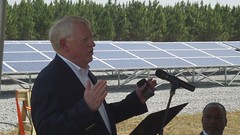According to Albor Ruiz in the New York Daily News, 12 June 2011,
Washington’s inaction on the immigration crisis is no longer sprouting only hostile and inhumane local laws. But there is growing evidence an increasing number of local and state officials have tired of playing an abusive and costly anti-immigration game they don’t believe in.And who benefits by arresting such people? Private prison companies, which hold the new prisoners.Two weeks ago, Gov. Cuomo pulled New York State from the Secure Communities federal deportation program, following Illinois Gov. Pat Quinn who had done the same weeks before. And days after Cuomo’s decision Massachusetts Gov. Deval Patrick took the same courageous step. All three governors are Democrats and strong allies of President Obama.
They had plenty of reasons to quit the controversial Department of Homeland Security program. Promoted as a tool to deport undocumented immigrants convicted of serious crimes, in reality Secure Communities targets mostly low-level offenders or those never convicted of any crime at all.
It’s not just northeast state, either. Here’s a city and state on the frontline of immigration, Los Angeles, California: Continue reading







.jpg)

